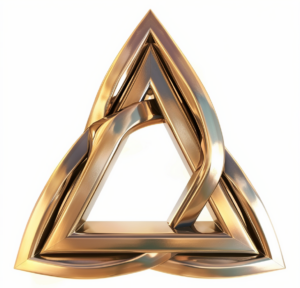Since God is a Trinity and God is in the Old Testament, the Trinity is in the Old Testament. But it isn’t as clearly revealed as it is in the New. The Old Testament speaks of God in a more general way. It anticipates the fuller revelation found in the New. But, together, they reveal who God is. To begin, let’s define our terms. The Trinity is the doctrine that there is only one God in all places and all time, who exists as three simultaneous, coeternal, and distinct persons. When we say person, we don’t mean individual beings. Personhood deals with self-awareness, awareness of others, self-identity, having a will, speaking, etc. The Father, the Son, and the Holy Spirit each exhibit these attributes. For more on this please see the article, Trinity Table.
We know that God reveals things little by little as is said in Isaiah.
Isaiah 28:13, “So the word of the LORD to them will be, “Order on order, order on order, Line on line, line on line, A little here, a little there,” That they may go and stumble backward, be broken, snared and taken captive.”
God is One, one what?
Deut. 6:4, “Hear, O Israel! The Lord is our God, the Lord is one!”
God speaks of Himself in the plural in the Old Testament
In the Old Testament, the Trinity is hinted at by showing how Yahweh refers to Himself in the plural.
- Gen. 1:26, “Then God said, “Let Us make man in Our image, according to Our likeness…”
- Notice that the one God refers to himself in the plural, three times: “Us, Our, Our.”
- Some people say that the “us” includes the Angels. But this does not work because Isaiah 44:24 says, “Thus says the LORD, your Redeemer, and the one who formed you from the womb, ‘I, the LORD, am the maker of all things, Stretching out the heavens by Myself and spreading out the earth all alone.'” So, God created us by Himself. The verse is not talking about angels.
- Gen. 19:24, “Then the LORD [YHWH] rained brimstone and fire from the LORD [YHWH] out of heaven on Sodom and Gomorrah.”
- Notice the subject-object relationship that suggests two YHWHs. But since we know there’s only one God who is Yahweh (Isaiah 43:10; 44:6, 8; 45:5), this cannot teach polytheism. It is again a reference to the plurality of God.
- Amos 4:10-11, “‘I sent a plague among you after the manner of Egypt; I slew your young men by the sword along with your captured horses, and I made the stench of your camp rise up in your nostrils; yet you have not returned to Me,’ declares the LORD [YHWH]. ‘I overthrew you as God overthrew Sodom and Gomorrah…’”
- In light of Gen. 19:24 above, this verse refers back to Gen. 19:24. Again, notice the subject-object relationship between YHWH and God.
God is seen in the Old Testament.
If God is a Trinity that manifests in the Old Testament, then we should see instances that can be solved by Trinitarian theology. That is exactly the case.
- Exodus 6:2-3, “God spoke further to Moses and said to him, ‘I am the LORD; and I appeared to Abraham, Isaac, and Jacob, as God Almighty, but by My name LORD I did not make myself known to them.’”
- Exodus 24:9-11, “Then Moses went up with Aaron, Nadab and Abihu, and seventy of the elders of Israel, and they saw the God of Israel; and under His feet there appeared to be a pavement of sapphire, as clear as the sky itself. Yet He did not stretch out His hand against the nobles of the sons of Israel; and they beheld God, and they ate and drank.”
When we look at these verses and compare them to Exodus 33:20, we find something interesting.
- Exodus 33:11, “Thus the LORD used to speak to Moses face to face, just as a man speaks to his friend. When Moses returned to the camp, his servant Joshua, the son of Nun, a young man, would not depart from the tent.”
- Exodus 33:20, “But He said, ‘You cannot see My face, for no man can see Me and live!‘”
These verses, in the same chapter and close to each other (nine verses apart), are not a contradiction if the Trinity is true. We see the plurality of God by being able to see Him (Exodus 24:9-11; 33:11; Num. 12:6-8) and also not being able to see Him (Exodus 33:20). Since the New Testament states that the Father has never been seen (John 6:46) and that He dwells in unapproachable light whom no man has seen or can see (1 Tim. 6:16), then we can understand that they were not seeing God the Father. They were seeing the pre-incarnate Christ, the Son. This is a strong hint of the Trinity in the Old Testament.
The Father in the Old Testament
We find that the Father, the Son, and the Holy Spirit are all mentioned in the Old Testament. We clearly see that God is considered a Father to Israel. We also see the Son and the Holy Spirit specifically addressed. Let’s take a look.
- Isaiah 63:16, “For You are our Father, though Abraham does not know us and Israel does not recognize us. You, O LORD, are our Father, Our Redeemer from of old is Your name.”
- Isaiah 64:8, “But now, O Lord, You are our Father, We are the clay, and You our potter, And all of us are the work of Your hand.”
- Jer. 3:19, “Then I said, ‘How I would set you among My sons And give you a pleasant land, The most beautiful inheritance of the nations!’ And I said, ‘You shall call Me, My Father, And not turn away from following Me.’”
God is referred to as the Father. Is this poetic, or is there a hint of distinguishing the persons? This becomes more clear when we see that in the Old Testament, there are verses that relate to the Son as well.
The Son in the Old Testament
- Psalm 2:7, “I will surely tell of the decree of the Lord: He said to Me, ‘You are My Son, Today I have begotten You.”
- Psalm 2:12, “Do homage to the Son, that He not become angry, and you perish in the way, for His wrath may soon be kindled. How blessed are all who take refuge in Him!”
- Isaiah 9:6, “For a child will be born to us, a son will be given to us. And the government will rest on His shoulders; And His name will be called Wonderful Counselor, Mighty God, Eternal Father, Prince of Peace.”
- Isaiah 53:4–5, “Surely our griefs He Himself bore, and our sorrows He carried. Yet we ourselves esteemed Him stricken, Smitten of God, and afflicted. 5 But He was pierced through for our transgressions, He was crushed for our iniquities; The chastening for our well-being fell upon Him, And by His scourging we are healed.”
- Psalm 22:14–16, “I am poured out like water, and all my bones are out of joint; My heart is like wax; It is melted within me. 15 My strength is dried up like a potsherd, And my tongue cleaves to my jaws, and You lay me in the dust of death. 16 For dogs have surrounded me; A band of evildoers has encompassed me; They pierced my hands and my feet.”
- Zech. 12:10, “I will pour out on the house of David and on the inhabitants of Jerusalem, the Spirit of grace and of supplication, so that they will look on Me whom they have pierced; and they will mourn for Him, as one mourns for an only son, and they will weep bitterly over Him like the bitter weeping over a firstborn.”
In these verses, we see multiple references to the Son (Psalm 2:7, 12). He is called God (Isaiah 9:6), He bore our sins (Isaiah 53:4-5), that He would be crucified (Psalm 22:14-16), and He would be pierced (Zech. 12:10). Undoubtedly, the Old Testament mentions the Son.
The Holy Spirit in the Old Testament
- Gen. 1:2, “The earth was formless and void, and darkness was over the surface of the deep, and the Spirit of God was moving over the surface of the waters.”
- 2 Chron. 24:20, “Then the Spirit of God came on Zechariah the son of Jehoiada the priest; and he stood above the people and said to them, ‘Thus God has said, ‘Why do you transgress the commandments of the LORD and do not prosper? Because you have forsaken the LORD, He has also forsaken you.’”
- Job 33:4, “The Spirit of God has made me, And the breath of the Almighty gives me life.”
- Ezekiel 11:24, “And the Spirit lifted me up and brought me in a vision by the Spirit of God to the exiles in Chaldea. So the vision that I had seen left me.”
- Joel 2:28–29, “It will come about after this That I will pour out My Spirit on all mankind; And your sons and daughters will prophesy, Your old men will dream dreams, Your young men will see visions. 29 “Even on the male and female servants I will pour out My Spirit in those days.”
The Spirit hovered over the surface of the deep at creation (Gen. 1:2). The Spirit comes over people, and they speak (2 Chron. 24:20). He is poured on people (Joel 2:28-29). The Spirit made people (Job 33:4) and gave visions (Ezekiel 11:24).
Conclusion
We see that God is one (Deut. 6:4), spoken of in the plural (Gen. 1:26; 19:24), with the mention of the Father (Isaiah 63:16; 64:8; Jer. 3:19), the Son (Psalm 2:7, 12; Isaiah 9:6), and the Holy Spirit (Gen. 1:2; 2 Crhon. 24:20; John 33:4; Joel 2:28-29). So, the Trinity is present in the Old Testament, though it is not as clearly represented as it is in the New Testament.






